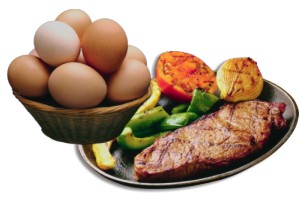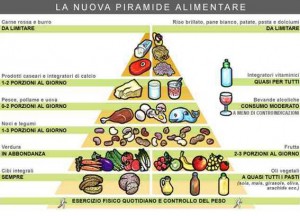The proteins are molecules composed of basic elements, formed by one, or more chains , called amino acids.They are present in all animal or vegetal organisms that perform  different tasks between them ,and are produced acording to the information contained in the DNA of every cell.Le proteins mainly differ in the sequence of amino acids that compose them.
different tasks between them ,and are produced acording to the information contained in the DNA of every cell.Le proteins mainly differ in the sequence of amino acids that compose them.
Why are the protein useful to the body
– are the backbone of the cells; are involved in the development and maintenance of organs and muscles.
– traveling from one point to another of the body by acting as signals between cells ( eg insulin, a protein that is produced when the sugar levels in the blood increase after the meal ) .
– defend the body against external attacks , as anticorps and send signals to activate the immune system,
– facilitate chemical reactions in the body, that otherwise would require a lot of time and temperature not compatible with life (enzymes)
-lead the function of the body : the hormonal system , transmission of the information , immunity , internal temperature,defending the body from infections and cancers.
– Contribute to loss of the weight by reducing the appetite and ensuring the maintenance of lean body mass ( muscle) instead of fat mass.
– stimulate the cells to produce enzymes that block viral activity (interferons) – the complement system :is a score of different proteins that interact like a “waterfall”. attracting phagocytes ( immune cells ) that “eat ” the invader , causing an inflammatory response that facilitates the activation of defense mechanisms . Are deposited on the surfaces of cells to be eliminated by making ” More visible ” to the immune system .
– cytokines : the chemical messengers that regulate the activity of cells of the immune system and make particularly active the response of white cells against malignant cells.
Proteins are necessary for the functions of the body , and are the principal constituents of the food pyramid .
On the table , however, we prefer those of animal origin ,
(meat , eggs, dairy products), rather than those of vegetable origin ( contained in legumes) . Eating too much meat is bad ,the scientists say. Meats , sausages, red meat ,increase the risk of cancer due to the various preservatives and dyes ,and to some decomposition processes of the digestive system that releases substances with inflammatory action and irritating the mucous membrane on the intestine , and then it is well known that people who eat lots of meat in general consume few
fruits and vegetables , and vice versa .
Altogether there are 20 kinds of amino acids , 8 of which are called ” essential ” insofar the human body can not manufacture them.
Animal proteins contain all the 20 amino acids found in nature while the plants may be deficient in some of them.The legumes,are lack of cysteine ( sulfur amino acids ) , but that are present in cereals (where lacking tryptophan and lysine )
The best substitute for animal protein sources ,and the combination of carbohydrates and vegetables is typical “Mediterranean ” food (pasta and beans , barley with vegetables , pasta and peas and so on.)
Protein and sports
If the body is not getting sufficient protein during intense physical exertion goes to undermine its internal protein stores . This phenomenon has a negative impact on the physical condition , endurance and performance .
The staple diet of an athlete should provide a protein intake of 15% of total energy requirements .
The proteins of plants can be replaced with dietary supplements of the highest quality.
ALL PLANT PROTEIN the highest quality proteins , provIde a balanced amount of the 9 essential amino acids.
NUTRILITE Sports Nutrition products and are designed to increase energy levels before, during and after training,restoring the needed nutrients in the body .
other items http://dipoco.altervista.org/
visit my website http://ginocosta.altervista.org/